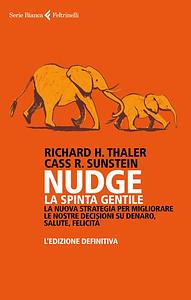Take a photo of a barcode or cover
Fascinated by the fresh ideas of libertarian paternalism. Way too much detail on issues that I am not really interested in - but still learned a lot about responsible and transparent nudges.
What a disappointment. An impressive first part, five stars, then completely debunked by themselves in the rest of the book. The authors, Richard H. Thaler and Cass R. Sunstein, tried to present “Nudge” as the typical book of science communication, parting from Psychology, Economics and Behavioural Economics, using the style of Dan Ariely and Steven Levitt, but this is not that kind of book, this is a badly disguised political pamphlet.
The entire book is grounded in one sole concept, “Libertarian Paternalism”, which means: "tries to influence choices in a way that will make choosers better off, as judged by themselves”, preserving the freedom of choice through t”he possibility “to opt out of specified arrangements if they choose to do so”. Translating this, means, to create a society of complete individual freedom where the state never prohibits or ban anything, but instead try to influence choices, designing society rules, in ways that will nudge people to go for the good solution.
This is at best, naif, but can also be seen as a Troy horse for complete Libertarianism, “laissez faire”, in the end the destruction of the state, of all the collective working for the well being of all, in the name of the most pure and abject individualism. If you still have any doubts about this, just think this book was written right before the great crisis of 2008. Think about the origins of that crisis, and compare them to what is being defended throughout this book.
Lastly, this book still maintains some interest, or better, the concept of Nudge is still relevant, but not to be applied to humans, but instead to be used in the design of machines. Choice architecture is a big problem in the design of interaction and experience, and so nudging can be an interesting approach. But you just need to read the first chapter of the book for that, forget the rest.
The entire book is grounded in one sole concept, “Libertarian Paternalism”, which means: "tries to influence choices in a way that will make choosers better off, as judged by themselves”, preserving the freedom of choice through t”he possibility “to opt out of specified arrangements if they choose to do so”. Translating this, means, to create a society of complete individual freedom where the state never prohibits or ban anything, but instead try to influence choices, designing society rules, in ways that will nudge people to go for the good solution.
This is at best, naif, but can also be seen as a Troy horse for complete Libertarianism, “laissez faire”, in the end the destruction of the state, of all the collective working for the well being of all, in the name of the most pure and abject individualism. If you still have any doubts about this, just think this book was written right before the great crisis of 2008. Think about the origins of that crisis, and compare them to what is being defended throughout this book.
Lastly, this book still maintains some interest, or better, the concept of Nudge is still relevant, but not to be applied to humans, but instead to be used in the design of machines. Choice architecture is a big problem in the design of interaction and experience, and so nudging can be an interesting approach. But you just need to read the first chapter of the book for that, forget the rest.
There are some useful parts but other remind me why i don't like econ for everyone books. and a lot of bad dad jokes.
Economists Richard Thaler and Cass Sustein argue that social policy makers should employ "nudges" to encourage consumer's to make good decisions without limiting their freedom to make bad ones. The first section of the book outlines these nudges and the remainder looks into case studies (e.g., marriage, health care, loans) as to how these nudges were successfully -- or unsuccessfully -- deployed.
The tone of this book was conversational and easy to understand. Each of the cases were well-explained. Ultimately, I didn't like this book because I felt that it could've been better organized (the case studies appeared to be chosen opportunistically). The authors did a great job dissecting how the US could implement "marriage" but I wasn't happy with how they cavalierly suggested that we invite more surveillance into our homes by installing real-time energy monitors.
Some of this material was also covered in Thaler's (newer) book Misbehaving. If you were between reading one or the other, I'd recommend Misbehaving over this book as it was more entertaining and just as educational.
Something I learned that I want to write down:
* Anchoring helps - Would you like to donate "5, 10, or 20 dollars" or "25, 50, or 100 dollars"?
* Defaults - People choose them (organ donation; with this it's better to force people to make a choice so that families know intent).
* There is no such thing as a neutral option. Even displaying things randomly affects people's choices.
* People are loss adverse. This can be mitigated by inviting them to "save more later".
* Framing - X people die vs 100-X people die.
* Peer Pressure - File your taxes, X% of Americans do so also!
* Too many choices are paralyzing.
The tone of this book was conversational and easy to understand. Each of the cases were well-explained. Ultimately, I didn't like this book because I felt that it could've been better organized (the case studies appeared to be chosen opportunistically). The authors did a great job dissecting how the US could implement "marriage" but I wasn't happy with how they cavalierly suggested that we invite more surveillance into our homes by installing real-time energy monitors.
Some of this material was also covered in Thaler's (newer) book Misbehaving. If you were between reading one or the other, I'd recommend Misbehaving over this book as it was more entertaining and just as educational.
Something I learned that I want to write down:
* Anchoring helps - Would you like to donate "5, 10, or 20 dollars" or "25, 50, or 100 dollars"?
* Defaults - People choose them (organ donation; with this it's better to force people to make a choice so that families know intent).
* There is no such thing as a neutral option. Even displaying things randomly affects people's choices.
* People are loss adverse. This can be mitigated by inviting them to "save more later".
* Framing - X people die vs 100-X people die.
* Peer Pressure - File your taxes, X% of Americans do so also!
* Too many choices are paralyzing.
I couldn't continue to subject myself to a man referring to a 'normal society' as Homer Simpsons. When he started out by explaining to the reader (me) what a footnote is he lost my respect. I can't take seriously a person who can't treat his audience as his equal. I see his point, and it's true, we are nudged every day from the big to the small. I will finish this book, if only so I can know what's coming and prepare accordingly, but don't expect a rating higher than 1 star from me.
I feel I read this years ago, but... maybe I didn't. The world of behavioral economics has been so in our face with [b: Freakonomics|1202|Freakonomics A Rogue Economist Explores the Hidden Side of Everything|Steven D. Levitt|https://i.gr-assets.com/images/S/compressed.photo.goodreads.com/books/1550917827l/1202._SX50_.jpg|5397] (podcast too) and Nudge Units and what not it is really hard to tell.
Anyway, listened to this on various car drives and its pretty interesting - the meat is the last section where the hard core recommendations from the first book - savings, warranties, medical, retirement, organ donation, climate change!, are revisited. I love this ***t, although I think that the authors continually struggle from a privileged perspective in placing their empathy and decision-making perspective sometimes (I was almost shouting out loud at some of the obvious gaffs on the medical insurance part while at the same time getting what they were focusing on).
The audiobook was a little strange, read (I think) by Thaler but referring to both himself and the other author (Sunstein) in a sometimes stilted third-person? Whatever.
Anyway, listened to this on various car drives and its pretty interesting - the meat is the last section where the hard core recommendations from the first book - savings, warranties, medical, retirement, organ donation, climate change!, are revisited. I love this ***t, although I think that the authors continually struggle from a privileged perspective in placing their empathy and decision-making perspective sometimes (I was almost shouting out loud at some of the obvious gaffs on the medical insurance part while at the same time getting what they were focusing on).
The audiobook was a little strange, read (I think) by Thaler but referring to both himself and the other author (Sunstein) in a sometimes stilted third-person? Whatever.
This was written in 2008 so there's obviously some sections in the book that are dated, usually technological or political (this was prior to Obama, Trump, AND Biden, after all), but it is interesting to think about
funny
informative
inspiring
reflective
medium-paced
People are gooff-e
Excellent take on inexpensive changes to influence socially beneficial behavior without crossing any freedom lines.
Merged review:
Excellent take on inexpensive changes to influence socially beneficial behavior without crossing any freedom lines.
Merged review:
Excellent take on inexpensive changes to influence socially beneficial behavior without crossing any freedom lines.



